The twenty-first century is still young — yet it has already produced an incredible array of nonfiction books probing all facets of human life. From uncovering invisible histories, to reflecting lyrically on medical conditions, to calling readers to political action, nonfiction writers can take us anywhere. They show us who we are, where we came from, and where we might be going.
We asked our community of 200,000 readers to vote for the most revelatory nonfiction books of all time. Without further ado, here are 60 of the best nonfiction books to peruse. These must-reads will keep you informed, inspired, entertained, and exhilarated as you journey through the most contentious and compelling topics in history and the contemporary world.
If you're feeling overwhelmed by the number of great nonfiction books to read, you can also take our 30-second quiz below to narrow it down quickly and get a personalized nonfiction book recommendation 😉
📚
Which nonfiction book should you read next?
Discover the perfect nonfiction book for you. Takes 30 seconds!
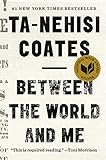
1. Between the World and Me by Ta-Nehisi Coates
Between the World and Me by Ta-Nehisi Coates offers a powerful history of racial violence in the United States — and what it means to be black in this country today. Presented in the form of a letter to the author’s teenage son, this nonfiction book weaves the personal and the political together in a series of searing essays.

2. The Emperor of All Maladies: A Biography of Cancer by Siddhartha Mukherjee
A disarming “biography” of disease, The Emperor of All Maladies chronicles thousands of years of people grappling with the terrifying specter of cancer. From the patients who have fought it, to the doctors who have treated it and the researchers who have sought to eradicate it, this riveting account captures the ongoing battle against a deadly condition.

3. The Sixth Extinction: An Unnatural History by Elizabeth Kolbert
When the next major mass extinction hits the planet, as scientists foretell it soon might, humanity will be the victim — and the perpetrator. The Sixth Extinction charts the transformative, and potentially catastrophic, impact of human activity on the planet, forcing us to consider what change we must enact now to ensure the continued survival of our species — and all species.

4. How to Survive a Plague by David France
David France has been one of the key chroniclers of the AIDS epidemic in the United States since its beginnings. How to Survive a Plague follows his acclaimed documentary of the same name, compiling a definitive work on AIDS activism. France draws from firsthand accounts and meticulous historical research to cement the legacy of all those who have battled the disease and fought the government and pharmaceutical companies for the rights to treatment. This nonfiction book ensures that their memories are not forgotten.

5. The Art of Cruelty: A Reckoning by Maggie Nelson
Cultural critic Maggie Nelson’s The Art of Cruelty contends with the history of violence across media and the arts, scrutinizing the moral implications of our obsession with acts of brutality enacted against living bodies. This is an essential text for anyone interested in how ethics and aesthetics intersect.

6. How to Do Nothing by Jenny Odell
When was the last time that you can say you really, truly did nothing at all? In a capitalist society that encourages constant action and productivity, it seems nearly impossible to not be doing something, but How to Do Nothing shows that there is another way to live. So go ahead, do nothing… after, of course, you’ve read this book.

7. 100 Essays I Don’t Have Time to Write by Sarah Ruhl
Sarah Ruhl has plenty to keep her busy: she is a prolific playwright as well as a mother, and routinely formulates more creative ideas than she has the time to fully realize. 100 Essays I Don’t Have Time to Write recounts all of those loose ends and sparks of inspiration that drive her as an artist. This collection of not-quite-essays bursts with wit and insight along its journey through the musings of a curious mind.

8. An Indigenous Peoples’ History of the United States by Roxanne Dunbar-Ortiz
An Indigenous Peoples’ History of the United States is the first comprehensive account of the nation told from an indigenous perspective. It is a damning indictment of white violence, and the centuries of genocide and erasure of native history that have accompanied colonial expansion. It is a story of the United States that has never been told before...but should have been told long ago.

9. The New Jim Crow by Michelle Alexander
Legal scholar Michelle Alexander argues that justice is neither truly blind nor colorblind — in fact, the criminal justice system in the United States systematically targets people of color and enacts racial oppression. The New Jim Crow is both a call to awareness and a call to action, making clear the deep harm embedded in systems ostensibly designed to protect us all.

10. The Year of Magical Thinking by Joan Didion
In The Year of Magical Thinking, an account of the year following the death of her husband John Gregory Dunne, literary icon Joan Didion offers an unguarded and revealing self-portrait of grief and anguish. Confronting bereavement occasionally leaves even one of America’s most lyrical writers at a loss for words. The stunningly vulnerable confessions that result are moving expressions of raw emotion.

11. Sapiens: A Brief History of Humankind by Yuval Noah Harari
Where did we humans come from? Where are we going? And what does it even mean to be “human” in the first place? These are some of the massive questions that historian Yuval Noah Harari attempts to unpack in Sapiens. While perhaps “brief” in its coverage on a scale of universal time, Sapiens still spans thousands of years of human life — showing us who we are as a species, as well as what we might become.

12. Thinking, Fast and Slow by Daniel Kahneman
Daniel Kahneman won the Nobel Prize in Economics for his groundbreaking research on cognitive biases and behavioral science. His book Thinking, Fast and Slow takes us through decades of his most essential research about how we think and why we make decisions the way we do — through the “fast” system of intuition and the “slow” system of logic. Kahneman’s conversational style makes even the most complex of psychological topics accessible to readers. After absorbing his insights, they’ll never think the same way again.

13. A Short History of Nearly Everything by Bill Bryson
Bill Bryson has garnered acclaim for his entertaining travelogues. Now he takes us along for the ride on the trip of a lifetime (and many previous lifetimes). A Short History of Nearly Everything is exactly what its title promises: a briskly paced adventure through the known universe, filled with plenty of wit and wondrous facts to fuel the journey.

14. When Breath Becomes Air by Paul Kalanithi
Doctor Paul Kalanithi confronted the possibility of death nearly every day in his work as a neurosurgeon… until one day the life at stake was his own. When Breath Becomes Air is his heart-wrenching memoir of coming to terms with his own mortality after a diagnosis of stage IV lung cancer. Though Kalanithi passed away from in 2015, his devastatingly beautiful reflection affirms the impact of his life on countless patients and readers.

15. Moneyball: The Art of Winning an Unfair Game by Michael Lewis
In Moneyball, Michael Lewis follows the story of the Oakland A’s and their unconventional strategy of scouting players, allowing them to choose the best talent for a fraction of the budget of other teams. On the surface, this is a story about baseball. But it is also a story about thinking differently and taking risks. Most importantly, it shows that when the game of life seems stacked against you, you don’t have to play along: you can reinvent the rules entirely.

16. Evicted: Poverty and Profit in the American City by Michael Desmond
Evicted is a gripping exploration of life on the margins for the untold numbers of people in America living in poverty. Desmond weaves his narrative from the stories of eight families in Milwaukee, showing the dearth of resources and affordable housing options available to them. Evicted is unafraid to say what is often left out of the conversation about poverty, as it forces readers to look at the dire state of American housing and homeownership.

17. Alexander Hamilton by Ron Chernow
The definitive portrait of a founding father — and of the foundations of America’s history — Alexander Hamilton is a brilliant biography, as audacious and awe-inspiring as its subject. It vividly portrays Hamilton’s intimate life as well as the grand scale of his impact, immortalizing the monumental figure who shaped the political spirit of a nation… and inspired a few Broadway musicals.

18. This Changes Everything: Capitalism vs. the Climate by Naomi Klein
The climate is not the only thing that is changing — in This Changes Everything, Naomi Klein shows us that life as we know it is changing, too. The entire future of the planet is now at stake. Addressing the climate crisis requires a radical transformation of our environmental and economic systems, and Klein’s wake-up call demands decisive action to ensure the continued liveability of the planet.

19. Dreamland by Sam Quinones
Drawing from intense investigative reporting and heartbreaking personal stories of addiction, Dreamland reveals how and why the opiate industry has wrought destruction on communities in the United States and Mexico. From prescription painkillers to black tar heroin, these drugs have devastating consequences, as Quinones reminds us. His book makes clear that real people are being harmed by corrosive capitalism.
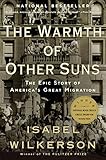
20. The Warmth of Other Suns by Isabel Wilkerson
The Warmth of Other Suns is one of the greatest tales of American history you’ve never heard. Wilkerson chronicles the years between 1915 and 1970, when millions of black Americans embarked northward or westward in search of opportunity, hoping to leave behind the racial prejudice and economic oppression of the South. What unfolds is a profoundly sympathetic and richly rendered story of countless families, seeking acceptance and better lives in the nation they call home.

21. Nothing to Envyby Barbara Demick
Though the citizens of North Korea consistently confront poverty and famine under the censorship of a repressive regime, little details about their lives sometimes escape the country’s impenetrable borders. Nothing to Envy ventures inside the world’s most closed-off society, giving voice to everyday people as they try to live their lives amidst totalitarianism. It is a haunting look at their despair and disillusionment — and the dreams they continue to nurture in spite of it all.

22. These Truths: A History of the United States by Jill Lepore
From acclaimed historian and New Yorker staff writer Jill Lepore, These Truths traces the birth of a country “forged in contradiction,” from its mythos as a land of opportunity to its history of extermination and oppression. Examining contemporary identity and politics through the lens of history, These Truths calls for a comprehensive reassessment of America’s past as well as its future.
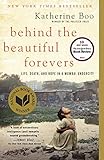
23. Behind the Beautiful Forevers by Katherine Boo
For the people of Annawadi, an impoverished community not far from the Mumbai airport, lives of luxury and economic prosperity are constantly within sight — but always out of reach. Though the building of upscale hotels and growth of the Indian economy initially gave residents hope of upward mobility, personal and political tragedy quickly dismantled their dreams. Behind the Beautiful Forevers is a shocking examination of pervasive inequality in contemporary India and the people left behind by the powerful elite.

24. Nickel and Dimed by Barbara Ehrenreich
For the millions of Americans who perform low-paying jobs, “unskilled” labor, the living wage they supposedly earn is by no means actually liveable. In Nickel and Dimed, journalist Barbara Ehrenreich goes undercover, journeying from Florida to Maine to Minnesota working a series of minimum-wage jobs. She quickly gains firsthand experience of the nearly insurmountable hardships the working poor encounter when they attempt to secure jobs or homes and put food on the table. Her eye-opening narrative reveals the dire situation of low-wage workers and the failures of employers and governments to provide anything near adequate support.

25. Blurred Lines by Vanessa Grigoriadis
In the wake of the #MeToo movement that has had transformative effects around the world, college campuses have become intensely scrutinized battlegrounds for debates about sexual politics. Vanessa Grigoriadis travels to universities across the United States to examine how the movement has prompted students to think differently about their sexuality, as well as the sexism or sexual violence they confront on campus. Unafraid to tackle controversial topics and contentious debates, Blurred Lines is a complex account of radical changes to contemporary culture.

26. Underland by Robert Macfarlane
Underland literally takes us beneath the surface of our world — venturing into underground caves, graves, and geological features. Yet Macfarlane also goes on a deep-time exploration and digs into the intertwined history of humans and nature, scrutinizing the traces we leave behind for generations to come. This riveting journey through time traverses the rich expanse of humankind’s past and future.

27. All the Single Ladies by Rebecca Traister
Journalist Rebecca Traister’s book All the Single Ladies underscores the collective power of single women, creating a vivid and diverse portrait of unmarried women in the United States. Composed of interviews and explorations of the history of women in intellectual and public life, this feminist book is a richly researched triumph.

28. The Invention of Nature by Andrea Wulf
You may not recognize the name Alexander von Humboldt. In The Invention of Nature, however, Andrea Wulf argues that he has undoubtedly shaped our understanding of the environment and our role in protecting it. Von Humboldt was a German naturalist and explorer, and his then-radical ideas — that nature existed for more than human consumption — paved the path for contemporary conservation movements. Wulf’s luminous look at his life, full of ecological exploration and scientific advocacy, shows the lasting impact of his ideas.

29. The Other Slavery by Andrés Reséndez
While countries in the Americas continue to grapple with the enduring horrors of slavery, there is a side to this devastating history that has never been fully confronted: the enslavement of indigenous peoples. The Other Slavery is a revelatory examination of the native populations enslaved throughout the western hemisphere, exposing how deeply entrenched oppression was in the creation of the “new world.” Reséndez’s fierce prose delivers on its promise to be “myth-shattering” and enlightening.

30. Devil in the Grove by Gilbert King
Thurgood Marshall, the Supreme Court’s first black justice, is perhaps the most significant legal figure of the twentieth century, arguing landmark civil rights cases. Devil in the Grove looks at the toughest cases he confronted before he was on the Supreme Court: fighting for “The Groveland Boys,” black workers in Florida’s orange industry who were subjected to horrific violence and lynchings in the Jim Crow South. This account of true crime and the fight for justice delves into Marshall’s origins as a fearless crusader — something not to be missed.
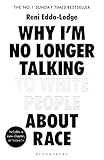
31. Why I’m No Longer Talking to White People About Race by Reni Eddo-Lodge
After watching intense debates about racism unfold in the United States, British journalist Reni Eddo-Lodge recognized that the same conversations were just as urgently necessary in Britain. This led her to write Why I’m No Longer Talking to White People About Race, one of the most accessible and best nonfiction books about the difficulties of, well, talking about race. Eddo-Lodge analyzes modern Britain’s race relations, reminding British and international readers alike of imperialism’s complicated history.

32. The Tipping Point: How Little Things Can Make a Big Difference by Malcolm Gladwell
This massively successful book by Malcolm Gladwell investigates the process of things going viral, dissecting how and why certain ideas can take off. The Tipping Point explores phenomena ranging from the sharp decrease in street crime in 1990s New York to children’s television shows suddenly becoming all the rage among all age groups. This is a sharp book that cannot fail to capture its readers with its masterfully recounted sociological and psychological case studies.

33. Quiet by Susan Cain
Susan Cain’s Quiet argues that Western society (and especially American society) is structured in a way that valorizes extroverted personality traits, to the detriment of introverts. In this nonfiction book, she defines the concept of introversion, traces its history, and proceeds with a mind-blowing analysis of our everyday lives and the biases inherent in the way people are assessed in a social atmosphere.

34. The Age of Surveillance Capitalism by Shoshanna Zuboff
Shoshanna Zuboff’s The Age of Surveillance Capitalism takes as its subject our current technological state, where corporations have access to a lot of personal information. Zuboff investigates the power and peril of digital surveillance, arguing that we have now entered a new age of capitalism where information and personal data are tools in the hands of corporations. A fascinating and thorough book, The Age of Surveillance Capitalism is guaranteed to provoke deep thinking about our relationship to tech.

35. On Writing by Stephen King
In On Writing, bestselling author Stephen King discusses his early-career struggles, offering advice to up-and-coming writers. Intimate, honest, and approachable, this book is one every aspiring author should read. This encouraging memoir thematizes the power of memory and the importance of perseverance. If you needed the inspiration to keep writing, this is one of the best nonfiction books for you.

36. Persepolis by Marjane Satrapi
Marjane Satrapi’s Persepolis is an immersive graphic memoir based on the author’s childhood in the Iranian capital of Tehran during the Islamic Revolution. As she grows up during a tumultuous chapter of the country’s history, her story is both a coming-of-age tale and a historical chronicle. Satrapi’s stark, black-and-white artwork supplements her text to create a thoroughly memorable reading experience.

37. Freakonomics by Steven D. Levitt and Stephen J. Dubner
Freakonomics, the famous nonfiction book by Steven D. Levitt and Stephen J. Dubner, reveals “the hidden side of everything,” as its subtitle makes clear. It’s a bold claim, but not one that it fails to live up to. The authors make the case for constantly asking questions, challenging accepted truths, and looking at facts and data in a novel way. Freakonomics is a witty, eye-opening interpretation of the economy, suitable to any reader with an interest in why things work the way they do.

38. SPQR by Mary Beard
Mary Beard’s SPQR is a sweeping and epic history of the Roman Empire, covering over 1000 years of the classical civilization’s story. In this cinematic account, Beard explores the growth of the empire and reflects on its multilayered legacy. Intelligent and informative, SPQR is an excellent choice for both devoted historians and casual nonfiction readers.

39. The Uninhabitable Earth by David Wallace-Wells
More urgent than ever, The Uninhabitable Earth by David Wallace-Wells draws attention to the pressing need to address the growing problem of climate change. This unsettling book warns about the potential devastation that awaits us in the near future — unless we can enact a revolution in how we tackle global warming.

40. The Silk Roads by Peter Frankopan
Another fascinating historical read, The Silk Roads by Peter Frankopan closes in on the relationship between the East and West. Examining and dismantling Eurocentric narratives, Frankopan’s illuminating work focuses on the history of countries lying on the “Silk Road,” the trade route connecting East and West, and attempts to re-balance history. In Frankopan’s version of world history, the center point of Western civilization is the Persian Empire.

41. Why We Sleep by Matthew Walker
Neuroscientist Matthew Walker’s Why We Sleep achieved sensational status due to its hyperfocus on a universal experience: sleep. Walker delves into the scientific specifics of why sleep is so important, and reminds his readers that sleep deprivation, though common in modern society, is a worrying phenomenon. This is one of the best nonfiction books to make a convincing case for being generous with our down-time and getting some rest.

42. Playing to the Gallery by Grayson Perry
Grayson Perry’s cheerful, informative, and inspiring Playing to the Gallery is a crash-course in art appreciation. According to Perry, no one is too ignorant to pursue an interest in art. This joyful and down-to-earth book is an excellent resource for anyone who’s interested in modern art but daunted by the sometimes-elitist institutions that represent it.

43. How Language Works by David Crystal
David Crystal’s How Language Works is a detailed, all-encompassing nonfiction book addressing the many questions that arise when you start to really think about the processes of using language. In learning more about language, you’ll also learn more about yourself, your idiolect, and your unconscious linguistic influences.

44. Political Order and Political Decay by Francis Fukuyama
In Political Order and Political Decay, political scientist Francis Fukuyama (famous for his 1992 book The End of History and the Last Man) explores the historical development of political institutions in various countries. In this insightful book, Fukuyama asks important questions about corruption and its eradication — and what it might take to run a well-functioning state in the present day.
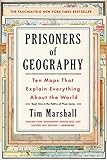
45. Prisoners of Geography by Tim Marshall
For cartography fans and or anyone with even a casual interest in geography, Tim Marshall’s Prisoners of Geography is a brilliant interpretation of ten modern maps. Marshall analyzes the geopolitical complexities of each region, showing the many layers and dimensions of our political reality as captured by cartographers. This book is guaranteed to change the way you view maps forever.
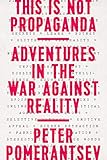
46. This is Not Propaganda by Peter Pomerantsev
Peter Pomerantsev’s This is Not Propaganda focuses on the complication and confusion of the current “disinformation” age. This book explores how surfaces can be deceiving, delving underneath them to examine (among other things) how Twitter, Reddit, and Facebook seep into our political thinking. This disturbing book provides fascinating insights important to everyone, but especially to readers troubled by the current involvement of digital technologies in the political realm.

47. The Corporation by Joel Bakan
Joel Bakan’s The Corporation draws an intriguing parallel between the psychopathic mindset and the way corporations grow. In this thought-provoking book, legal theorist Bakan uses his training in law to break down the potential of power to corrupt both individuals and corporations.He supplements this analysis with several informative interviews investigating the psychology of pursuing success.
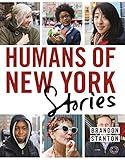
48. Humans of New York: Stories by Brandon Stanton
Brandon Stanton’s photo interview series “Humans of New York” initially became famous on Facebook for capturing everyday lives. This utterly heartwarming (and heart-wrenching) volume compiles multiple stories into a book you can hold. In Humans of New York, interviewees bare their souls to Brandon as they pose for his camera, creating a meaningful reminder of our shared and enduring humanity.

49. The Element by Ken Robinson with Lou Aronica
Champion of creativity Ken Robinson urges artistic minds to follow their heart and identify their “element” in his inspirational nonfiction book The Element. Your element, he explains, is where passion intersects with talent: that’s where you can harness your own power the most. Robinson argues for educational reform that will make helping students find their element a priority, as it is the key to unlocking creativity and innovation for the future.

50. Eating Animals by Jonathan Safran Foer
Written by successful novelist Jonathan Safran Foer, Eating Animals is a passionate testament to vegetarianism and a philosophical, ethical, and moral assessment of our eating habits, with a special focus on our consumption of animal products. It’s a provocative reading experience, and it’s sure to stay with you for a long time.

51. Is That a Fish in Your Ear? by David Bellos
David Bellos’s Is That a Fish in Your Ear? is a witty, informative ode to the practice of literary translation. Bellos, himself a translator, details the individual aspects of style that complicate translation — like humor. As a result, he opens reader’s eyes to the countless artistic microdecisions obscured behind the curtain of translation. This exciting book will inspire you to seek translated books from other languages and open yourself up to new worlds.
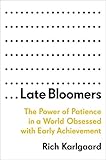
52. Late Bloomers by Rich Karlgaard
In Late Bloomers, Rich Karlgaard dispels the assumption that all genius must emerge in days of youth. He argues that our culture’s obsession with early achievement discourages older members of society from pursuing their passion and talents, pleading for the world to consider “a kinder clock for human development” instead. His book presents an alternative outlook that would empower more people among us to follow their dreams, because it’s never too late!

53. How to Write an Autobiographical Novel by Alexander Chee
Alexander Chee’s collection of essays, How to Write an Autobiographical Novel, muses on the subjects of art and identity, as well as the craft of writing itself. This thoughtful and reflective book is an impactful invitation into the interior world of one of America’s most acclaimed essayists.

54. The God Delusion by Richard Dawkins
A brutal and honest nonfiction book, The God Delusion is an unapologetic defense of atheism by Richard Dawkins. The author is entirely unconvinced by religion, and explains his reasoning in this detailed and expansive work. His provocative challenge to readers’ views is sure to prompt spiritual soul-searching for fellow atheists and religious readers alike.

55. Afropean by Johny Pitts
“European” doesn’t automatically mean “White.” Afropean, a captivating documentation of the history and experience of black Europeans, seeks to challenge this common assumption, turning the spotlight onto black communities in several European countries. This Jhalak Prize-winning work is exciting and invigorating, ready to take you along on a journey across Europe.
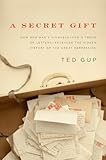
56. A Secret Gift by Ted Gup
One day, journalist Ted Gup discovered letters addressed to his grandfather from suffering families in Canton, Ohio, from the time of the Great Depression. Following that epistolary trail seventy-five years later, Gup uncovered the story of how his immigrant grandfather secretly helped fellow Cantonians, discovering more about his own grandfather as well as the history of America in the process. A Secret Gift is a masterful and moving tale about the past, and a reminder of the importance of kindness and generosity.

57. The Glass Castle by Jeanette Walls
Jeanette Walls’s The Glass Castle is a tender, humorous account of the author’s nomadic childhood, which has been adapted into an acclaimed movie. This astonishing memoir especially focuses on the author’s relationship with her bohemian-minded parents, whose flaws and eccentricities are described with deep affection, no matter how difficult they are to live with. Simply written and honestly told, this memoir is a true accomplishment.
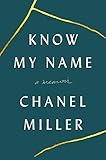
58. Know My Name: A Memoir by Chanel Miller
Have you heard of Chanel Miller? Maybe not — but it’s likely you’ve heard of the man who sexually assaulted her on Stanford University’s campus: Brock Turner. In Know My Name, a searing memoir of trauma and recovery, Chanel writes herself back into the narrative, claiming the right to tell her own story. Brave and enlightening, this is a difficult but important read.

59. 1491: New Revelations of the Americas Before Columbus by Charles C. Mann
The way most history textbooks tell it, Europeans brought civilization to the Americas with the arrival of Columbus in 1492. Not so fast, says Charles C. Mann’s 1491, a book that’s here to challenge the accepted version of history. Mann offers an utterly transformative historical account of the Americas, reversing the general assumption that its inhabitants were simple villagers before the arrival of European colonizers.
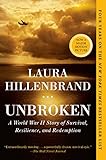
60. Unbroken: A World War II Story of Survival, Resilience and Redemption by Laura Hillenbrand
Laura Hillenbrand’s Unbroken tells the unbelievable story of Louis Zamperini, the rebellious American son of Italian immigrants who found himself a lieutenant in World War II. This breathtaking tale about the Second World War is sobering, informative, and brilliantly told — an essential read for anyone interested in the War’s effect on individual lives.
***
Eager for more of the best contemporary reads? Check out our list of the 21 best novels of the 21st century!
